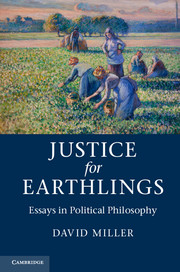Book contents
- Frontmatter
- Contents
- Acknowledgements
- Introduction
- 1 Political philosophy for Earthlings
- 2 Two ways to think about justice
- 3 Social justice in multicultural societies
- 4 Liberalism, equal opportunities and cultural commitments
- 5 Equality of opportunity and the family
- 6 Justice and boundaries
- 7 Social justice versus global justice?
- 8 ‘Are they my poor?’: the problem of altruism in a world of strangers
- 9 Taking up the slack? Responsibility and justice in situations of partial compliance
- 10 A tale of two cities; or, political philosophy as lamentation
- Index
- References
1 - Political philosophy for Earthlings
Published online by Cambridge University Press: 05 February 2013
- Frontmatter
- Contents
- Acknowledgements
- Introduction
- 1 Political philosophy for Earthlings
- 2 Two ways to think about justice
- 3 Social justice in multicultural societies
- 4 Liberalism, equal opportunities and cultural commitments
- 5 Equality of opportunity and the family
- 6 Justice and boundaries
- 7 Social justice versus global justice?
- 8 ‘Are they my poor?’: the problem of altruism in a world of strangers
- 9 Taking up the slack? Responsibility and justice in situations of partial compliance
- 10 A tale of two cities; or, political philosophy as lamentation
- Index
- References
Summary
The question that I want to pursue in this chapter concerns the relationship between political philosophy as a normative enterprise whose purpose is to identify and justify principles intended to guide us politically, and what we can call the facts of political life – everything that we know about human beings and human societies, either through common sense or through the more formal methods of the social sciences. How, if at all, do the principles of political philosophy depend on those facts, in the sense that if the world changes in certain ways, or we make new discoveries about it, our political concepts and principles should change too? This question has several dimensions to it. We can treat it as a question about the formal structure of political theories: given that such theories often include descriptive or explanatory claims about human nature, or about how societies or governments function, as well as normative claims about how we ought to organize our collective life, what precisely is the relationship between the two kinds of claim? If the empirical claims are shown to be false, does that mean that the normative claims must be abandoned too, or can they survive without such support? But our question also bears directly on a more practical issue: how should we, as scholars, go about doing political philosophy? Ought we to be spending considerable amounts of our time immersing ourselves in the literature of history and the social sciences, in order that the empirical claims we make are as well grounded as possible, or should we be focussing our attention more narrowly on conceptual and normative questions – trying to decide, for example, what liberty means or whether liberty and equality are compatible – without concerning ourselves too much, at this stage at least, about aspects of the real world that might bear on the conclusions we reach? And finally, there is a third issue, which concerns the purpose or point of engaging in political philosophy in the first place. How far should we intend our theories to have a practical impact, that is to say contain ideas that people engaged in real-world politics can take up and act upon when drafting legislation or making public policy?
- Type
- Chapter
- Information
- Justice for EarthlingsEssays in Political Philosophy, pp. 16 - 39Publisher: Cambridge University PressPrint publication year: 2013
References
- 5
- Cited by



